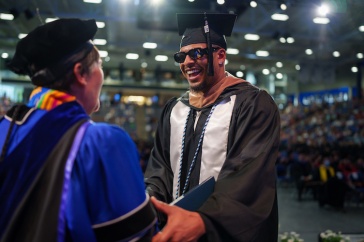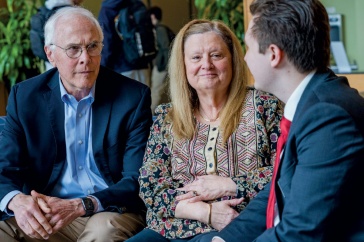
break in Washington, D.C., where they met
with alums in a variety of industries and saw
the value of a UNH business degree in action.
It’s the typical business networking reception. Food and drinks. High-top tables. Entrepreneurs and executives, dressed in business casual for an after-work gathering, signing in and writing out their nametags — the extroverts immediately connecting, while others break into conversations more slowly.
However, these are not the leaders of corporations and nonprofits — at least not yet. They’re first-year students at the Peter T. Paul College of Business and Economics learning skills that will be essential to their success in the business world.
The “mocktail” networking event was just one example of the types of activities students take part in through FIRE, the First-year Innovation and Research Experience. This brand new program, which builds upon the college’s longstanding peer-advising program, is already exceeding expectations.
FIRE’s mission is “to build a community of engaged student learners who value academic excellence, intellectual, personal and professional development, inclusion and ethical conduct.” As Neil Niman, associate dean of academic programs, explains, FIRE does that by helping first-year students successfully transition to college and experience what Paul College and UNH have to offer.
Paul’s first-year class is divided into teams of 20 to 25 students that undertake a year-long, game-like experience, with alumni and peer mentors from the junior and senior classes as their guides. Their goal, in addition to creating a business plan aimed at solving a complex real-world problem, is to develop habits that will set them up for success at UNH and in the paths they follow after graduation, Niman says.
FIRE students work with UNH and Paul College alumni volunteers from the classes of 1971 through 2014 from such varied corporations and organizations as GE, Salesforce, Liberty Mutual, Direct Capital, Fidelity and the Portsmouth Music Hall. Peter T. Paul ’67 provided funding support toward the program’s first year: “Without his help and generosity, I’m not sure it would have gotten off the ground,” Niman says.
The FIRE teams are working to solve problems separate from their academic classes, Niman explains, so grades are not on the line as students delve into either “Colonizing Mars,” “Living Virtually,” “Powering the Northeast,” “Prolonging Life” or “Surviving Extreme Weather.”
“We chose big ideas that lend themselves to multiple approaches with foundations in science and technology, broad implications for society, political consequences and economic factors,” Niman says.

Sean Stewart ’13, FIRE’s program coordinator, knows he would have benefited from the program as a student. “It helps students get involved right from the start,” he says. FIRE has an interdisciplinary component, Stewart adds, “because successful Paul College graduates need to be well-rounded, with a broader perspective, looking beyond their courses in business and economics to understand problems and positively affect change.”
Dot Sheehan ’71 agrees. As the founder and president of Operation Hat Trick, the UNH-based organization that supports recovery-focused initiatives for wounded veterans through the sale of licensed hats, she knows firsthand how an innovative idea can make a difference. “Operation Hat Trick is a nonprofit, but it is also a brand,” she explains. “Our primary purpose is to help people. By combining love of country with love of sports, teams and schools, we created a unique business model and applied it to a societal need that is not going away.”
Sheehan also brings stories of what these young veterans, some of whom are not much older than her FIRE students , are experiencing. “You can succeed helping people,” Sheehan says. “I want to send students that message now.”

Mentor Rob Drouin ’07 says he’s gotten back as much as he’s given. “Motivating students to see that what their professors and career professionals are telling them is very real and applicable is a worthwhile venture for both parties,” he says. “These students will one day be my colleagues.”
An IT professional, Drouin became an adviser for FIRE in part, he explains, because UNH “was the springboard for me and my career, and I feel a sense of pride and accountability for the future of students that come from the university. Alumni who enjoyed their time at UNH are eager to give back.”
Working in higher education, mentor Sarah Sceery ’11, a gift officer at Merrimack College, knows the importance of alumni involvement. “I’m proud to be a part of what UNH is doing,” she says. “FIRE is an impactful and important program. It is creating the foundation for students to be successful and make a difference.”

All three alumni advisers praised the caliber of Paul College’s students. Kate Aiken ’19 and Ryan Anastasi ’19 are among FIRE’s “Igniters,” first-year students nominated by their peers to serve as a student advisory group.
“FIRE is an outstanding program that has really made me feel at home at UNH,” Aiken says. “ The Great Hall is my living room, and I always see a familiar face passing through.”
Anastasi enjoys the program’s game components. “FIRE rewards us for attending new events and joining student organizations, and that is a major benefit for us,” he says, adding he has also learned practical skills, such as creating a LinkedIn profile “to build those connections that are vital in the professional world.”

Brian Finney ’16, head peer adviser, says FIRE is providing students with unique opportunities for personal development and learning real-world skills. “Mentorship is huge,” he says of success in college and in the business world. “I think the first-year students are building a stronger network with each other through FIRE, and the benefits will just continue from there.”
Mentor Drouin says FIRE meets a need that no classroom can. “Academics is one piece of what makes a student successful. These programs are necessary to complement the academic aspect of a student’s growth with a lesson in professionalism and career-oriented teachings.”
Thanks to FIRE, Aiken predicts that, “the Class of 2019 will be the most collectively engaged group the college has seen.”


Originally published in UNH Magazine Spring 2016 Issue
-
Written By:
Jennifer Saunders | Communications and Public Affairs | jennifer.saunders@unh.edu | 603-862-3585

















































